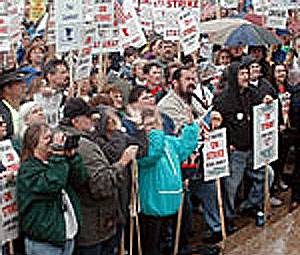|
Audio
Photos
More from MPR
Your Voice
|
With contracts set to expire, negotiators and state workers square off
June 13, 2003
 |
| Hundreds of state workers rallied at the Capitol at the height of the 2001 strike. (MPR file photo) |
St. Paul, Minn. — The current contract was negotiated in 2001 after a two-week strike by thousands of state workers. But because of a dispute over benefits for same-sex partners of public employees, the agreements weren't ratified until last April. Now it's time to start over again.
Peter Benner, the executive director of the American Federation of State, County, and Municipal Employees, Council 6 -- the state's largest public employees union --says the bargaining comes on the heels of a particularly dramatic legislative session.
 | |||
"There was a set of issues involving the ratification of our current agreement and then setting the parameters for future negotiations which was more intense than anything we've seen since the current bargaining law came into effect in the 1970s," he says.
The Legislature ultimately threw out the domestic partner benefits before accepting the current contract. Moreover, House Republicans, and to some extent the Pawlenty administration, supported new policy changes that angered state unions.
They attempted to classify some healthcare workers as "essential," thereby taking away their right to strike. They hoped to expand outsourcing of government work to private companies. And they tried to impose a wage and benefits freeze that would have swept those issues off the bargaining table before the parties had even sat down.
All of those initiatives failed. But Employee Relations Commissioner Cal Ludeman says it won't make the new contract talks any easier. Ludeman says the state budget doesn't have money set aside for wage growth, and he says health care expense in the private and public sector must be brought under control.
"These costs continue to go up at extraordinary rates, double-digit rates, which we don't like. When you have a tight budget or a balanced budget that doesn't have supplements in it, that means changes in insurance. And that could be uncomfortable," according to Ludeman.
Union leaders say state employees have faced months -- even years -- of bad economic news and feel they were neglected during the boom of the 1990s. While they say they're realistic about the state's budget woes, they also say they'll fight to keep the wages and benefits they currently have.
Jim Monroe, the executive director of the Minnesota Association of Professional Employees, says the state's budget shortfall, the heavy reductions in planned state spending, and Republican legislative initiatives have left many workers feeling traumatized.
"I think there's, on the part of the working men and women, some distrust of the state. And it's being reflected in negotiations proceeding and slowing up, proceeding and slowing up, I guess, would be the best way to describe it," says Monroe.
The lean budget has already forced the state to eliminate some positions. The Employee Relations Department estimates as many as 900 jobs have been cut systemwide so far this year. AFSCME and MAPE predict that number could stretch beyond 2,000 as agencies absorb their budget reductions.
Lance Teachworth, the former head of the state Bureau of Mediation, oversaw negotiations between state workers and former Gov. Jesse Ventura's administration during the last strike. Teachworth says the tight economic times only complicate an already contentious process.
"You don't have as much to work with. In a situation where you've got a surplus, you can address several different kinds of issues and you have more flexibility. You have more to work with to reach an agreement," sys Teachworth.
State and union officials so far have declined to comment on the specifics of negotiations, but they all say talks have so far been professional. Pressure is likely to intensify, however, as the summer slips by.
|
News Headlines
|
Related Subjects
|
